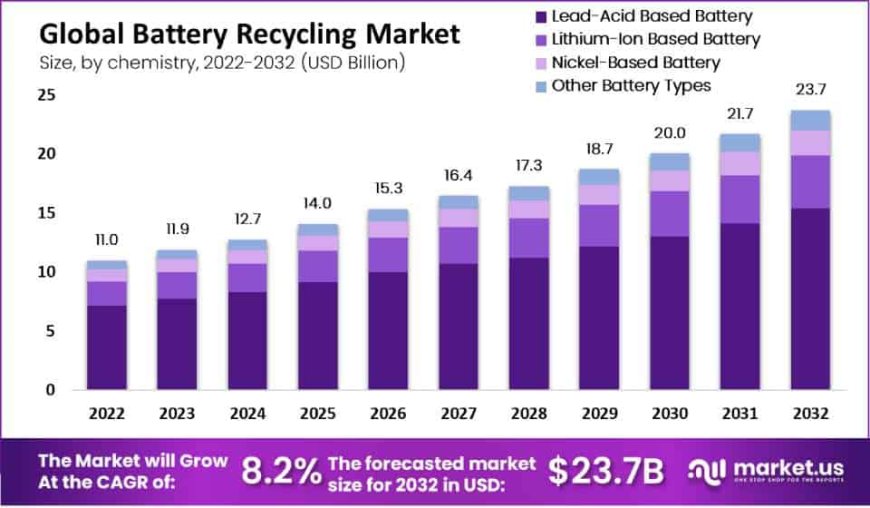Key Players in Battery Recycling: Leading the Charge Towards Sustainability
Battery Recycling Market By Chemistry (Lead-Acid Based Battery, Lithium-Ion Based Battery, and Other Battery Types), By Source (Automotive Batteries, Industrial Batteries, and Other Sources), By Application, By Region and Companies - Industry Segment Outlook, Market Assessment, Competition Scenario, Trends, and Forecast 2023-2032
Battery Recycling Market was valued at USD 11 billion and it is expected to reach USD 23.7 billion by 2032. Between 2023 and 2032, this market is estimated to register the highest CAGR of 8.2%.
Battery recycling market has seen significant growth, driven by increasing environmental concerns, the demand for rare metals, and government regulations mandating responsible battery disposal. This market, valued at USD 11 billion in 2032 with an impressive compound annual growth rate of 8.2% from 2023 to 2032, is poised for further expansion, projected to reach USD 23.7 billion.
Industrial sectors, accounting for 53% of market share, heavily contribute to this growth, with automotive applications leading due to the rise in electric and hybrid vehicles.
Despite these opportunities, the battery recycling market faces challenges such as high startup costs for recycling facilities, inadequate collection infrastructure, and logistical complexities in battery transportation. However, ongoing innovations in recycling technologies and increased investments in sustainable practices offer promising growth prospects.
Trends like advanced recycling methods and the integration of recycled materials into new battery production underscore a growing emphasis on environmental responsibility, particularly in the electric vehicle industry.
Get a Sample Copy with Graphs & List of Figures @ https://market.us/report/battery-recycling-market/request-sample/
Key Market Segments
Based on Chemistry
-
Lead-Acid Based Battery
-
Lithium-Ion Based Battery
-
Nickel-Based Battery
-
Other Battery Types
Based on Source
-
Automotive Batteries
-
Industrial Batteries
-
Electronic Appliance Batteries
-
Other Sources
Based on Application
-
Automotive
-
Consumer Electronics
-
Energy Storage
-
Other Applications
Based on chemistry, lead-acid batteries dominated the market in 2022 due to their widespread use in energy storage applications and lower recycling costs compared to other types. Looking ahead, lithium-ion battery recycling is projected to see significant growth driven by the expanding electric vehicle (EV) market. With increasing adoption of EVs globally and government initiatives promoting electrification, the demand for recycled lithium-ion batteries is expected to rise sharply.
Within applications, automotive holds the largest market share due to the growing popularity of hybrid and electric vehicles (EVs) and efforts to promote cleaner transportation solutions globally. Government regulations supporting the EV market, coupled with increasing environmental awareness among consumers, are driving the demand for recycled batteries as a sustainable solution in automotive applications.
Market Key Players
-
G&P Batteries
-
Retriev Technologies Inc.
-
Exide Technologies
-
Battery Solutions LLC
-
EnerSys
-
Umicore N.V.
-
LI-CYCLE CORP.
-
Call2Recycle Inc.
-
uRecycle
-
East Penn Manufacturing Company
-
American Manganese Inc.
-
BASF
-
Johnson Matthey
-
Other Key Players
Drivers:
The widespread use of batteries across various sectors such as electronics, automotive, and energy storage leads to substantial waste generation, driving the battery recycling market. Increasing environmental concerns due to battery dumping prompt governments worldwide to enforce recycling regulations, boosting market growth.
Restraints:
Battery recycling faces significant challenges due to the toxic and hazardous materials they contain, requiring specialized handling and processing methods to avoid environmental and safety risks. High operational costs associated with safe recycling processes also hinder market growth, posing financial challenges to recycling facilities and stakeholders.
Opportunity:
Strict government regulations and increasing public awareness about environmental sustainability create opportunities for growth in the battery recycling market. As countries implement more stringent recycling policies, there is a growing demand for efficient and safe battery recycling solutions, opening avenues for innovation and investment in recycling technologies.
Challenge:
Balancing the need for safe handling of hazardous materials with the operational costs of recycling poses a persistent challenge. Developing cost-effective recycling technologies while ensuring environmental and safety standards are met remains crucial for the sustainable growth of the battery recycling market.


Files
What's Your Reaction?
 Like
0
Like
0
 Dislike
0
Dislike
0
 Love
0
Love
0
 Funny
0
Funny
0
 Angry
0
Angry
0
 Sad
0
Sad
0
 Wow
0
Wow
0



















































